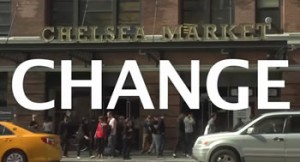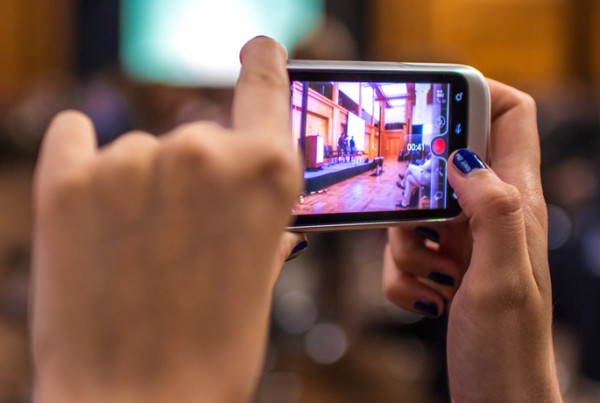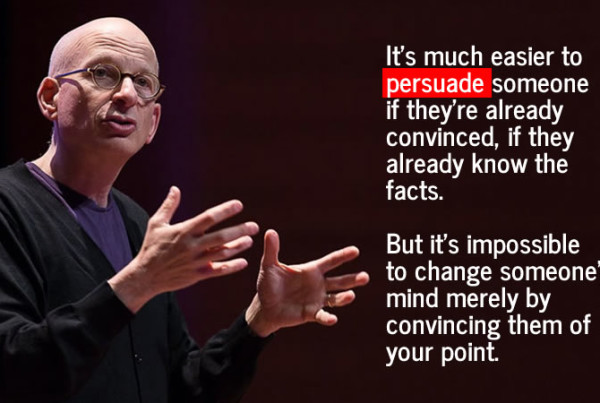The speed of change in culture, marketing and media is accelerating.
 I’m not a gloom and doom kind of guy. Perhaps with the lone exception being when I think about how many traditional advertising agencies are handling social media and accordingly what may lie ahead for them.
I’m not a gloom and doom kind of guy. Perhaps with the lone exception being when I think about how many traditional advertising agencies are handling social media and accordingly what may lie ahead for them.
I don’t walk around feeling that the NSA is spying on my boring life. I see the national debt as outrageous, but I have faith in the resilience of this country. I know I shouldn’t eat blueberry muffins in the morning, but hey, we all have our vices.
No, I’m far from being a pessimist. I just like to think of myself as a realist. So when I tell you that the gold rush of social media is over, I’m not at all being a “Debbie-downer“, I’m just looking at the landscape and seeing things for what they truly are. Or at least how I see it. You can choose to believe me or not. I actually prefer that you don’t.
You see the more people who don’t see the social media iceberg ahead, the more opportunity there will be for those of us who do. Now understand, I’m not seeing a social media apocalypse. Just a drastic change from what we all see as social media marketing today.
Unfortunately for some, it’s already too late to steer away from the iceberg ahead. Their rudders are hopelessly locked in and there’s no saving them. Those are the brands, agencies and social media practitioners who ignored (or didn’t understand) what the data has been foretelling.
This belief that I have has been underscored by a lot of data that has been published over the last few months. Data that has been presented by very credible sources, including that published by some of the social networks themselves.
Facebook seems to be shooting itself in the foot on an almost daily basis and it’s quite obvious that unless something drastically changes, brands spending a lot of focus on Facebook without committing substantial dollars to Facebook advertising are just wasting their time.
It appears that the gig is up on Facebook. But a lot of brands and their agencies just don’t seem to understand it.
As for content, there’s only a few reasons why people have any interest in content from a brand. A recent study has shown that there are really only 5 reasons that people would share a brand’s content. Nobody wakes up wanting to see brand messaging. Many brands and their agencies are practicing futility. Some of them actually have become pretty good at futility and mediocrity.
What many feel to realize is that people just don’t really care all that much about what a brand has to say. It’s apparent that for the most part, the noise and clutter is causing consumers to simply avoid most brands on social media.
A recent study released by WPP shop Mindshare has concluded that we may be seeing a real shift in the way consumers look at brands on social media.
Quite a few findings in their latest “Culture Vulture 2014” report were worth noting.
Less than half (47%) of respondents agreed that “When I see or hear something interesting about a brand I like to pass it on.” That’s down from the 66% of consumers who agreed with that statement four years ago.
Think about that for a moment. In just four years, consumer interest in brand content has dropped 20%! That tells me that he clutter has become too noisy and that people are looking the other way. It also tells me that many brands aren’t creating the type of content that people want to see or care about.
It tells me that too many brands and agencies are worried about posting what matters to them instead of what matters to their audience.
65% of those who responded — said they would now purchase a generic product that is on sale instead of the branded version of the product they normally use. That compares to 57% who felt that way prior to the recession.
The value exchange between brand and consumer is not being fostered. The development of brand affinity is being retarded. Instead of connecting with users on social media, many brands are actually doing just the opposite.
“Our findings show that a majority of brands are seeing their relationships with consumers weakening,” said Mark Potts, Managing Director, Mindshare North America. “This is clearly a huge issue for marketers, as we know that in this technology and social media age consumers should be connecting with their favorite brands and sharing them.”
It’s clear that the messaging has to change on social media. In fact the change may have to be a turn from pushing any messaging at all. People want to see authentic, interesting content. No one subscribes to brand messaging.
There’s so much data being analyzed these days but instead of focusing on metrics, we’ll need to begin looking more to psychology and biology. In 2014 we social marketers may need to morph into digital anthropologists.
Brands may need to do a rethink about “how they’re adapting to new consumer expectations in order to better connect to their emotions and behaviors,” said Potts. “In 2014 brands can rekindle their relationship with consumers by creating unique content and experiences tailored for their specific interests, lifestyles, and behaviors, which are embedded in science and real-time responsiveness.”
It’s obvious that social media marketing will have to change. I believe we’re going to see some brands embrace the absence of messaging. Those brands will create content that is specifically designed to increase affinity by appealing to emotion and behavioral needs.
The brands and agencies that continue to foist commercial messages that provide no real value exchange between the audience and the brand will fail in their social media marketing efforts moving forward.
Unfortunately (or fortunately), too many brands and traditional agencies aren’t set-up to adapt to the anthropological changes that are needed to succeed in today’s evolving digital landscape.
The good news is that the end of social media as we now know it equals great opportunity for those who do adapt.


